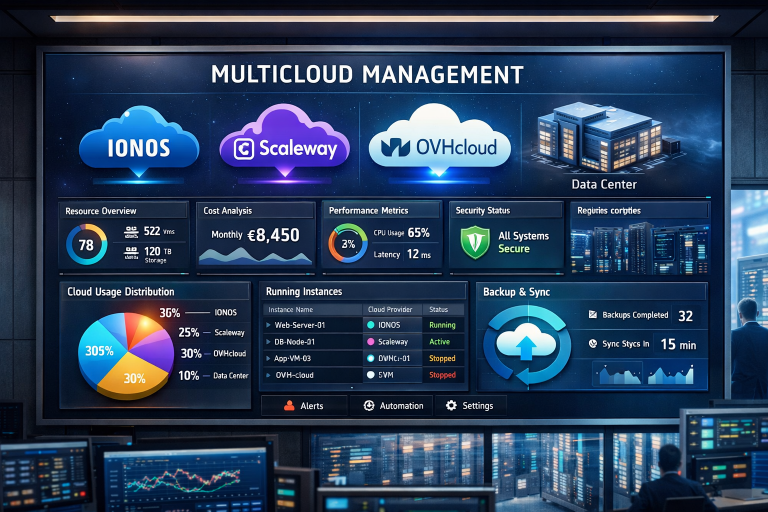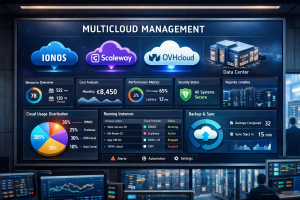Over the past decade, cloud adoption across Africa has surged, driven by digital transformation efforts across banking, education, telecom, and government. Yet, despite this upward trajectory, the continent still holds less than 1% of the global cloud market share. That statistic alone is both sobering and revealing.
As of early 2025, 54% of African enterprises use some form of cloud services, but only 24% have made the leap to private cloud infrastructure — a clear sign that most businesses are still experimenting rather than building long-term strategies.
The reality? Africa’s cloud challenges are not just technical — they’re deeply contextual. Internet penetration remains at just 43%, with over 600 million people offline. Power instability, legacy infrastructure, and unreliable connectivity continue to affect business continuity across entire sectors. Meanwhile, 97% of organisations cite serious tech talent shortages, with local engineers increasingly working remotely for international firms.
Despite these hurdles, private cloud represents one of the most strategic opportunities for African CTOs. It offers data sovereignty, regulatory compliance, cost control, and performance advantages — but only when deployed with a clear understanding of Africa’s unique operational constraints.
Unfortunately, too many CTOs adopt cloud strategies based on models built for Europe, Asia, or North America — and that’s where things go wrong.
Copy-paste cloud doesn’t work here. Africa needs its own blueprint — one that embraces its realities while leveraging its strengths.
In this article, we’ll walk you through some of the most common mistakes made when adopting private clouds, and more importantly, how to avoid them. If you want to build scalable, secure, and future-proof infrastructure — this is where your journey begins.
 What is a private hosted cloud?
What is a private hosted cloud?
A private cloud is a dedicated cloud environment — software and hardware resources exclusively allocated to one organization. Unlike public clouds (shared infrastructure), private clouds offer:
- Full control and customization over hardware/software
- Stronger security and regulatory compliance
- Consistent performance and resource allocation
- Greater flexibility for evolving needs
In a hosted private cloud model, a service provider manages the infrastructure (hardware, updates, network), while the client retains full control over the environment, apps, and data.
 5 biggest mistakes to avoid
5 biggest mistakes to avoid
1. Skipping a clear cloud strategy
Too often, cloud projects are launched without a roadmap. In many African organisations, top management remains cautious due to past infrastructure challenges and cost concerns.
But cloud transformation only works with a clear, phased strategy:
Define your objectives: cost savings, compliance, app modernisation, AI-readiness
Align IT goals with core business outcomes
Identify key processes to migrate and automate
Set realistic milestones for scale and expansion

2. Underestimating resource constraints
Limited budgets, intermittent power, and unreliable internet are daily operational facts. Still, many CTOs overestimate what their current infrastructure can handle.
Instead of stalling, you should:
Start small using automation-ready platforms
Leverage open-source cloud technologies like OpenNebula or Proxmox
Use compact, energy-efficient infrastructure (e.g., NUCs, ARM devices)
Design for simplicity to reduce staffing overhead

3. Ignoring training and skills development
Cloud doesn’t run itself. With the local talent pool shrinking due to global remote work opportunities, internal upskilling is critical.
Train your IT team to handle:
- Cloud-native tools (OpenNebula, Terraform, Ansible)
- CI/CD pipelines and DevOps automation
- Monitoring, fault tolerance, and recovery

4. Choosing the Wrong Tech Stack
Many CTOs chase the cheapest stack — not the most reliable or secure one. The result? Downtime, vendor lock-in, and performance issues.
Choose open-source tools that are:
Well-supported by the community
Designed for cloud infrastructure (e.g., Ceph, KVM, MinIO)
Modular and adaptable for future integrations

5. Neglecting Security, Privacy & Compliance
Africa’s regulatory environment is evolving fast, but many teams defer compliance until it’s too late — exposing themselves to data breaches and legal risk.
Instead, build security into the foundation:
- Implement RBAC, encryption, and Zero Trust networking
- Design for compliance (NDPR, PoPIA, and other local laws)
- Stay audit-ready and align with global standards (ISO, GDPR if applicable)

 Bonus: Don’t forget AI in your private cloud strategy
Bonus: Don’t forget AI in your private cloud strategy
Private cloud is not just about infrastructure — it’s your launchpad for AI innovation.
With a well-built local cloud, you can:
Deploy internal AI environments (e.g., Jupyter, TensorFlow, LLaMA)
Enable AIOps for automated monitoring, failure prediction, and scaling
Monetize AI-as-a-Service with APIs for NLP, fraud detection, or local-language chatbots

 Talk to Experts — Don’t do it alone
Talk to Experts — Don’t do it alone
Private cloud adoption comes with strategic, technical, and regulatory complexities. Trying to navigate them without local guidance often leads to delays, missteps, or wasted investments.
Work with consultants who understand:
- Local cloud infrastructure and business needs
- Power and internet realities
- Open-source private cloud tooling
- Security, compliance, and AI integration
The right partner accelerates your launch, avoids costly rework, and helps train your team for long-term success.
Private cloud, when done right, is a game-changer for African businesses. It enables cost control, scalability, data sovereignty — and now, AI-readiness.
But to truly unlock its value, CTOs must avoid common pitfalls. Plan strategically, invest in people, and build with tools and partners who understand the African landscape.
Want to build your own cloud — faster, smarter, and locally?
Cloud Inspire — Your Cloud. Your Rules. Built for Africa.











